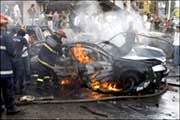debkafile: Murder of another anti-Syrian Lebanese lawmaker was Damascus’ greeting for Middle East visitor US Secretary Rice
Wednesday, Sept 19, the day Condoleezza Rice arrived for talks with Israeli and Palestinian leaders, a car bomb in East Beirut killed lawmaker Antoine Ghanem, further reducing the anti-Syrian majority in parliament six days ahead of its election of a new Lebanese president. Bashar Assad was signaling that he was not deterred from his policies by the Israeli air attack of Sept 6 and would not let American influence displace his grip on Beirut.
debkafile‘s counter-terror sources note Syria’s fingerprints all over the assassination of Antoine Ghanem, 64, the 8th anti-Syrian MP to be murdered in two years. Two days earlier, this member of the Christian Phalangist party returned secretly from Abu Dhabi. He had been in hiding after being threatened with death should he run for election. On his return, he told his friends the Syrians and their Lebanese supporters were after him to whittle down parliamentary support for an anti-Syrian president.
The tip-off on his return to Beirut must have come from a regional intelligence service with spies in the oil emirate. That, plus the method and speed with which the plot was assembled, point to Damascus’ experienced hand. The bomb car loaded with 40 kilos of explosives perfectly tallied with the means used to assassinate another anti-Syrian lawmaker, Walid Eido, on July 14.
Syria was bluntly accused of the crime by leader of the 14 March majority Saad Hariri, whose father was blown up in February 2005, and Druze leader Walid Jumblat, whose father also died at Syrian hands in the 70s, when Bashar Assad’s father Hafez was Syrian president.
The US secretary of state did not have an easy ride in her effort to inject substance into President Bush’s international conference in Washington two months hence. Israeli leaders made a show of goodwill – Ehud Olmert’s close adviser Haim Ramon even conjured up a largely unfeasible plan to transfer parts of Jerusalem to the Palestinians – but by and large Israel prefers declarations to deeds. Palestinian leader Mahmoud Abbas, for his part, said that without substantial progress towards establishing a Palestinian state, there is no point in him attending.
Without the Palestinians and the Saudis, the conference is a non-starter.
In other areas, Rice’s arrival found Israel on the move:
1. The security cabinet declared the Gaza Strip a hostile territory controlled by a hostile force, Hamas. While this decision could pave the way for Israel to cut off electricity, water and other services to Gaza – if the Qassam missiles continue to fly against Israeli populated areas in the Negev, which has not yet been decided – it also cuts Abbas off from possible steps to restore his dialogue with Hamas.
2. The IDF’s Givati armored infantry brigade began a large training exercise on the Golan backed by engineering and air units. Only two weeks ago, Israeli politicians harped on the need to ease military tensions with Syria. They promised the summer maneuvers being wound up would not be followed by further military activity. Yet all of a sudden, Givati was pulled out of the Gaza Strip sector and moved up north.
And on the very day of her arrival, Israel’s opposition leader, former PM Binyamin Netanyahu let the cat out of the bag and became the first Israeli politician to confirm foreign media reports of an Israeli air operation against Syria on Sept. 6, saying he had been privy to its details from its outset. He was roundly condemned as an irresponsible blabbermouth.
Rice may have set out on her journey meaning to promote Middle East peace diplomacy. What she found was a climate of confrontation, animosity and war tension.


